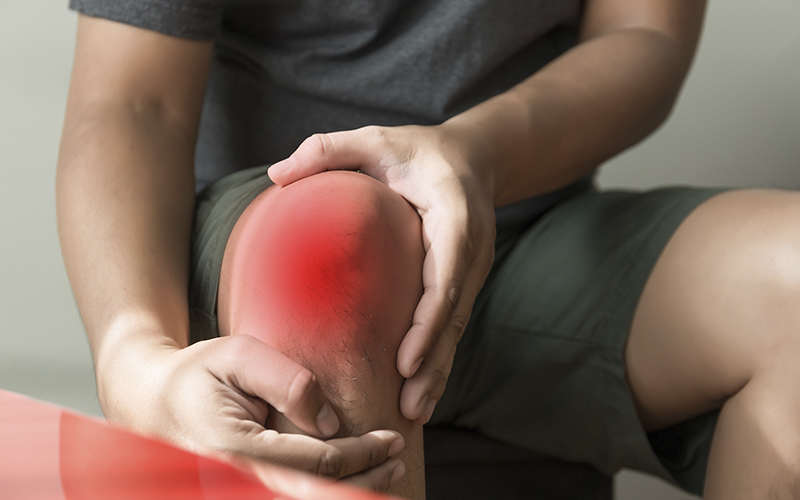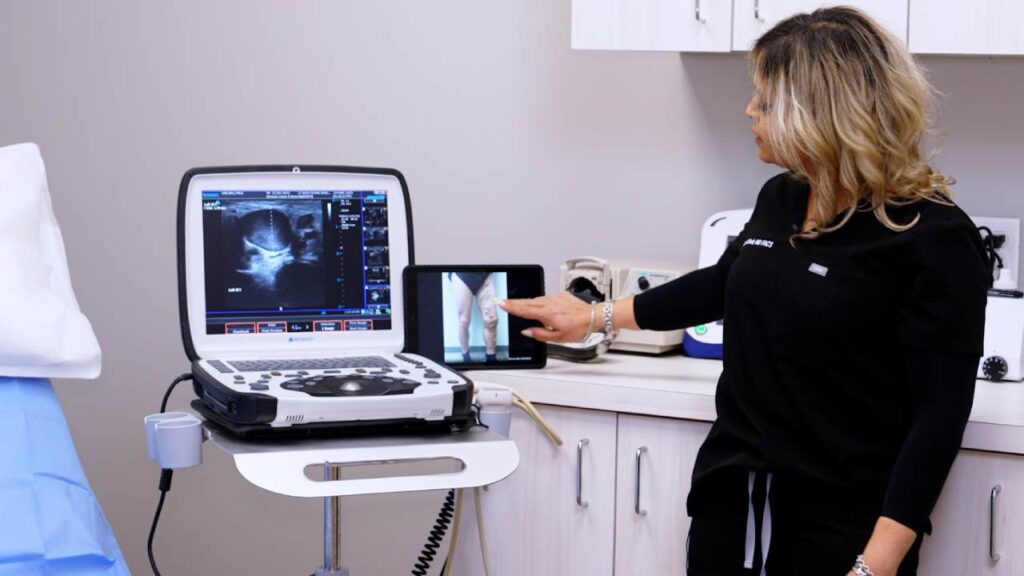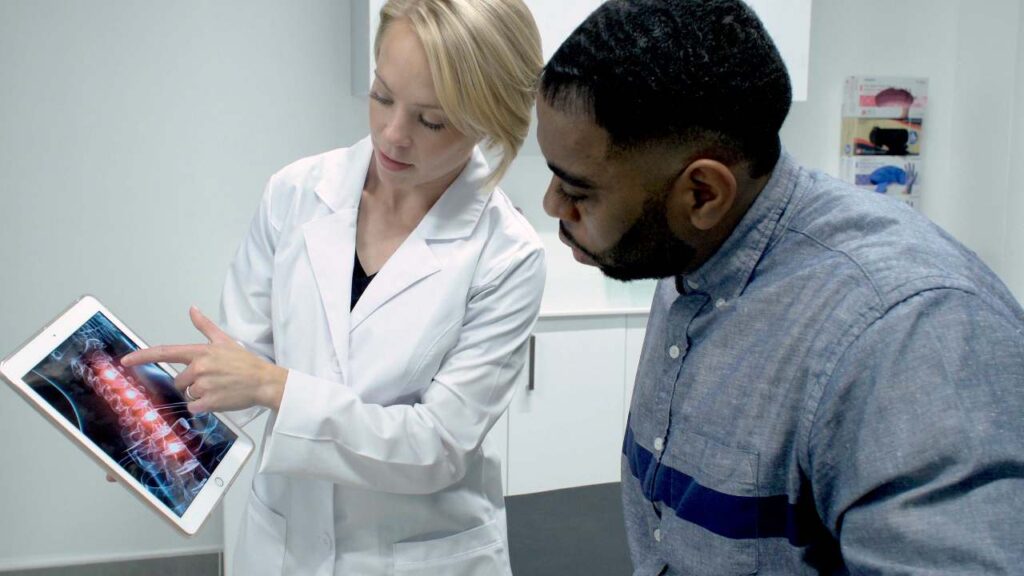Injections Or Knee Replacement For Knee Pain? | A Harvard Doctor Explains
What’s Better: Injections Or Knee Replacement For Knee Pain?
If you’re struggling with knee pain, then you aren’t the only one. Knee pain affects millions of Americans every year and can significantly impact quality of life. If your knee pain is not accurately diagnosed and treated, it can get progressively worse over time and lead to further health complications. Knee pain can result from a medical condition such as arthritis, to joint pain as a result of a sporting injury. Some people even struggle with knee pain due to the consequences of living a more sedentary lifestyle.

Due to the multitude of reasons you might have knee pain, it is important to receive medical attention. What’s better: knee injections or knee replacement for knee pain?
Nowadays, many orthopedic surgeons rely on knee replacement surgery to treat the knee joint. This involves a highly invasive surgical procedure in addition to the use of narcotics and NSAIDs. It’s important to highlight that unnecessary surgery carry many risks, including but not limited to: blood clots, wound site infections, allergic reactions to anesthesia, and long recovery periods. In addition, using long term pain relief post-surgery has negative side effects. Whilst pain medication can reduce inflammation, tenderness and swelling, there are many negative side effects that research has been demonstrating for a number of years. The side effects include drowsiness, nausea and in some cases, addiction.
The great news is that there are many effective knee pain injections that directly target knee pain and assist in the rehabilitation of patients. These injections enjoy successful outcomes, high levels of patient satisfaction and immediate and lasting pain relief. Before committing to unnecessary surgical procedures, consider visiting a Board Certified pain doctor who can discuss the best treatment options to suit you.
Let’s take a look at some of the latest knee injections that directly target the knee and reduce inflammation, swelling and knee pain.
Steroid Injections/ Corticosteroids
This procedure is the first choice of knee pain treatment. It is a fast, safe and effective way to directly target knee pain and provide immediate pain relief that can be felt for weeks and even months after the procedure!
During this procedure, your pain doctor will topically anesthetize the knee to ensure you are comfortable. Next, they will inject the tissue surrounding the knee with a mix of corticosteroid and local anesthetic. This reduces inflammation, pain and swelling whilst providing immediate pain relief. The injecting needle is then withdrawn, and your pain doctor will wrap a sterile bandage around the injection site to ensure it is kept clean and protected.
Hyaluronic Acid Injections/ Viscosupplementation
Hyaluronic Acid/ Viscosupplementation is usually the second line of treatment for knee pain and is a successful treatment choice for patients. It is based on the principle that increasing the lubrication between your joints reduces friction and subsequent pain.
As a result, a pain doctor injects Hyaluronic Acid into the soft tissue of the knee joint to lubricate the cartilage between the bones. Cartilage is important as it acts as a shock absorber and can prevent trauma or further injury to the knee. If cartilage lacks lubrication, it is harder for the bones to glide over one another, creating friction. This friction can therefore lead to pain, inflammation, and swelling.
Hyaluronic Acid injections are a safe and effective means to increase the suppleness between the bones, allowing them to glide over one another and ensure fluid movement. It is also important to note that Hyaluronic Acid is produced naturally in the body, so receiving these injections is perfectly safe.
During this procedure, your pain doctor will remove a small volume of Hyaluronic Acid from your knee joint so that more space is created to inject a fresh dose of it into your knee. Your pain doctor may also use a local anesthetic to ensure you are kept comfortable throughout the procedure. In some instances, pain doctors prefer to use the assistance of an X-Ray machine to ensure they are directly targeting the area of pain in your knee.
Hyaluronic Acid injections are an excellent means to increase the fluidity of movement in the knee joint. Most patients only need a few injections and enjoy quick recovery periods and immediate improvement in knee pain symptoms. In particular, these injections are highly effective for individuals who have knee osteoarthritis.
Platelet Rich Plasma PRP
Platelet Rich Plasma PRP injections are a highly recommended treatment of choice for tendonitis and osteoarthritis. They are also commonly used to treat tendinosis and sporting injuries.
PRP injections work by having your pain doctor extract a small amount of blood from your body. Your pain doctor will then remove the important growth factors from your blood. These growth factors trigger the growth and development of healthy new cells. Your pain doctor therefore extracts these growth factors from your blood in order to inject them into soft tissue in the knee joint. This promotes the growth of healthy, new tissue in the knee. The procedure will use anesthetic to ensure that you’re comfortable throughout it.
PRP injections are an exciting area of pain medicine and are an excellent means to encourage the growth of healthy, new tissue in the knee joint. This means you don’t have to rely on lengthy recovery periods or unnecessary, invasive surgeries!
Why Should I See A Pain Doctor?
The best kind of doctor to assess and treat pain is a pain doctor. Pain doctors are also known as pain management specialists (or pain physicians) and combine their extensive training, skill and experience in pain medicine to effectively treat a wide variety of pain conditions.
Pain doctors are leaders in the field of pain medicine and are expert in directly assessing and targeting the source of your pain. This can range from chronic knee pain caused by a medical condition, to pain sustained from traumatic injury. In particular, pain doctors help their patients to avoid unnecessary surgeries that require long recovery periods and extensive use of narcotics and NSAIDs. It is no secret that the United States is facing an opioid epidemic, and research is highlighting the negative consequences associated with long term narcotics use.
The central goal of pain doctors is to utilize the latest techniques in pain medicine to treat your pain without invasive surgeries or lengthy periods using NSAIDs and narcotics. They will begin by taking a medical history and ordering necessary scans (such as ultrasound or X-Ray) to gain an overall picture of the problem. Following on from this, they will prescribe the best physical therapist to suit you, in addition to R.I.C.E. (rest, ice, compression, elevation) and a suitable procedure (like Hyaluronic Acid injections). Your pain doctor will work with you throughout the process and will be on hand to answer any concerns you may have. By visiting a pain doctor, you will be able to effectively explore all your treatment options that maximize your health through minimally invasive procedures.
Why Do I Have Knee Pain?
Now that we have discussed the best knee pain treatment options, let’s take a look at the reasons you might be struggling with knee pain.
Knee pain can be attributed to many different causes, which is why it is important to seek medical advice from a Board Certified pain doctor. If a knee issue is not accurately diagnosed and treated, the pain may get worse or lead to further complications.
Here are some of the most common causes of knee issues:
- Bursitis – when your joints become painful, tender and swollen.
- Dislocated knee cap – the knee cap can potentially alter shape after a sudden movement or impact.
- Tendonitis – this is when a tendon can swell and become even more tender and painful after having had a tendon injury.
- Sprains and strains – this can occur if too much strain is put on muscles and ligaments.
- Osteoarthritis – this is usually associated with older individuals.
As there are many potential reasons for knee pain, it is highly recommended to seek medical advice from a pain doctor. Pain doctors are experts in assessing and treating a range of pain conditions and have access to the latest techniques to treat your pain in a conservative, effective way. Pain doctors believe in using the latest techniques in regenerative medicine to work with you so that you are back to full health as soon as possible.







